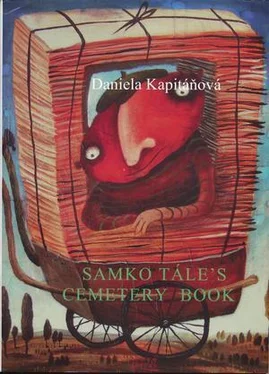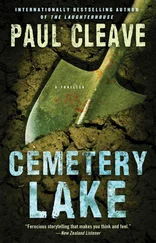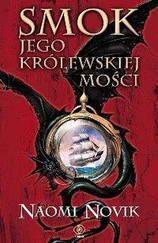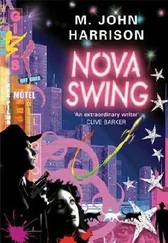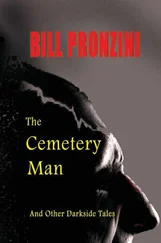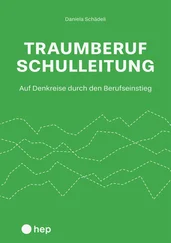I put some rubber foam around the handle in the winter to keep my hands warm because this is serious work and I can’t always wear gloves because I wouldn’t be able to tie knots on the ropes to stop the cardboard from falling off. Sometimes when my skin gets chapped, I treat it with Indulóna Lotion with Healing Power.
Indulóna Lotion with Healing Power is very good.
Anyway.
So Darinka Gunárová shook hands with me, but I didn’t know what I was supposed to say so I just laughed and Darinka Gunárová laughed, too.
But her name isn’t Darinka Gunárová any more because she’s married to a black man now. Her black husband’s name is Samuel Quentin, like mine. I don’t mean that my name is Samuel Quentin like his because my name is Samuel Tále. Because I’m not black, I’m Slovak.
A long time ago I heard people say that Darinka Gunárová had married a black man in America but I didn’t believe them, because people often make up things like that, and they used to gossip about Darinka when she was still married to that fat slob Manica. They already gossiped about her then. I never gossiped about Darinka Gunárová, either when she was married to that fat slob Manica or at any other time.
I hated that fat slob Manica because he was the first one in Komárno to shout at me like this:
‘Everybody thinks
Samko Tále stinks.’
He shouted like that even before he married Darinka, just because he felt like it.
So that’s why I didn’t believe it when I heard that she had married a black man, because even that fat slob Manica was white, not black.
And besides, nobody in Komárno had ever married a black person before. Because there are enough Slovaks around, right?
Right.
But then I saw him with my own eyes. It was when Darinka Gunárová’s Mum died and I went to her funeral. Of course it goes without saying that I didn’t go there because I wanted to see Darinka Gunárová and her husband the black man. That’s out of the question. I went there out of respect because Karol Gunár (PhD Social Sciences) was my friend. And that’s when I saw that he was a real black man.
Just like on TV.
Because I’ve seen lots of black men on TV before but this one was really real, not like on TV. He was really black. And he was almost as tall as my Grandfather from Detva even though he was black.
But the thing is, my Grandfather from Detva was white and all the real people who are for real and not on TV are white. Except for Gypsies, but they don’t count because they are Gypsies.
Once there was this man in Komárno whose name was Harry H. Torry, but he wasn’t from Komárno, he was from America. And he wasn’t black, he was white, just as if he was from Komárno. That’s how white he was. Just like people from Komárno. He was a teacher regarding English lessons because that’s the law now.
Harry H. Torry was a teacher in a school for normal children but that wasn’t enough for him, so he went to Gypsy schools and gave Gypsy children English lessons for free.
There’s just one thing I don’t get: what was the point of giving them English lessons, surely it’s enough for them to speak Gypsy to steal my cardboard from the Market Place, right?
Right.
But this Harry H. Torry kept saying that Gypsies were suppressed in Komárno regarding being Gypsies, and he kept saying that all people were equal and that Slovaks were just like Gypsies. But it wasn’t a good idea to say things like that, even though he came from America and people respected him due to that, because when he said that Slovaks were just like Gypsies people got offended and didn’t want him to teach their children any more.
I got offended, too.
Because nobody wants to be all equal with Gypsies, and that’s why he had to go back to America earlier than he planned. As he was leaving, he packed all his bags and suitcases and his tennis racket and went to say goodbye to his Gypsies and while he was saying goodbye, the Gypsies stole all his bags and suitcases as well as his tennis racket.
So Harry H. Torry went to the police and told them what had happened and the police had a good laugh and said that now he could see what the difference was between a Gypsy and a Slovak. Then they got in a police car and took him around the Gypsy houses and in one hour they got all his things back, except for his tennis racket because the Gypsies had already burned it because they had a fire.
And then the people were happy and thought that Harry H. Torry now understood the difference between Gypsies and Slovaks, but I don’t think he understood anything because he kept saying that there was no difference. And after that people weren’t happy any more and Harry H. Torry had to leave again. And when he got back to America he wrote to all the newspapers about people in Slovakia being racial.
But the one thing I don’t get is why he wrote that people in Slovakia were racial because it wasn’t the people who stole his bags and his suitcases as well as his tennis racket, it was the Gypsies, right?
Right.
I’m not racial at all because I’m very nice.
And the way you can tell is because whenever I watch a film on TV and someone in the film is racial towards Red Indians or slaves, I get very angry about them being racial, and if they get punished it makes me very happy.
I don’t know if Alf Névéry was racial or not because he didn’t have a TV set so we couldn’t talk about it. If he’d had a TV set I would have known.
Margita and Valent Anka aren’t racial either, because we don’t have any Red Indians or slaves in Komárno. Maybe they have some in Bratislava, so maybe Ivana is racial but I don’t know about that.
Because she’s very weird and she and Žebrák never complain about Hungarians or Czechs, but it goes without saying that the reason why they don’t complain is because Žebrák’s father was a Czech. Otherwise I’m sure they would complain, because if you don’t complain people might notice and they wouldn’t trust you any more because you would be suspicious.
I’m not suspicious because I complain.
But I never complain about Red Indians or slaves because I’m not racial.
Once there was this man in Komárno whose name was Otrok which means slave in Slovak, but it was just his name, not his job. He was a slave by name, not by profession. His name was Štefan Otrok but people called him Pišta Otrok because that’s what you say in Hungarian if somebody’s name is Štefan. And he used to buy and sell feathers and his wife used to make duvets out of them. He had a car with a loudspeaker and he used to drive around town shouting through the loudspeaker about buying feathers and making duvets and that made him very popular. He was especially popular due to the humorous things regarding feathers and duvets that he used to say.
Some people used to follow his car just to hear what humorous things he was going to say regarding feathers and duvets. And sometimes, when he passed me in his car, he would say humorous things regarding me too through the loudspeaker and then I would also follow his car and shout at him like this:
‘Otrok Pišta,
Shitty mister’
And everybody laughed because it was humorous.
Štefan Otrok laughed too and this is what he shouted into his loudspeaker:
‘Everybody thinks
Samko Tále stinks.
And I laughed too, even though I don’t like it but the loudspeaker made it sound humorous.
Then Štefan Otrok’s wife ran off to Poland with a Polish man and left him here with all the feathers and duvets but Štefan Otrok gave it all up and stopped buying and making and saying humorous things.
His wife was 58 years old when she ran off. The Polish man was 38 years old. Štefan Otrok was 68 years old.
Читать дальше
